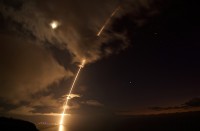WELLINGTON, New Zealand (AFP) — Pacific Rim leaders will begin a virtual summit Friday, facing pressure to back up ambitious rhetoric on climate change and chart a path to pandemic recovery.
The annual Asia-Pacific Economic Cooperation (APEC) summit brings together leaders from 21 nations, including US President Joe Biden and his Chinese counterpart Xi Jinping.
Xi is among those who have talked on the sidelines of the New Zealand-hosted event, stressing the need for the Covid-19 recovery to fuel “green, low-carbon and sustainable development”.
“We in the Asia-Pacific should make the post-pandemic recovery a green one and take the lead in making a science-based response to climate change,” he said.
South Korea President Moon Jae-in said switching to clean energy sources amounted to nothing less than “a great transformation of civilisation” affecting all of humanity.
But the major climate-related reform announced so far has been an agreement to push for a freeze on fossil fuel subsidies — an idea APEC leaders first touted more than a decade ago but failed to implement.
New Zealand Prime Minister Jacinda Ardern, who is hosting the summit virtually because of the pandemic, admitted the action did not go far enough.
“Do we need to be more ambitious than this? Absolutely,” she said.
“We would of course like to see a world where there are no fossil fuel subsidies in our economies, that’s long been a position of New Zealand, which we will continue to advocate.”
“If the world is not ready to take bold action on climate change, then the world must be ready for the disastrous results of climate change,” she added.
The leaders are expected to issue a communique early Saturday detailing the outcomes of the meeting at a press conference fronted by Ardern.
Climate Council of Australia ecologist Lesley Hughes said the document needed to contain a blueprint for real change if APEC wanted credibility on climate change.
“We’d like to see some sort of sensible transition right out of fossil fuel, not just a freeze on more subsidies,” she told AFP.
“We’d want to be seeing as many details with numbers as possible, such as exactly how much these fossil fuel subsidies are worth in each country.
“And also timelines, a declaration without an actual year by which it will be achieved is just empty words.”
APEC leaders have refrained from public criticising each others’ climate record at this year’s meeting, but Hughes said countries viewed as reluctant to implement change were likely to face fierce behind-the-scenes criticism.
“I would expect so, Australia’s certainly seeing an enormous amount of pressure at COP26 because it’s continually ranked bottom of the pack on climate action,” she said.
Cold War redux?
The summit comes against the backdrop of growing competition between the United States and China, the region’s preeminent military and economic powers.
It may offer a brief preview of the hotly awaited virtual summit between US President Joe Biden and his Chinese counterpart Xi expected as soon as Monday.
Tensions between Washington and Beijing have been building over Taiwan, human rights and trade.
China last month made a record number of air incursions near Taiwan, a self-ruling democracy claimed by Beijing, prompting Washington to stress it would help Taiwan defend itself if needed.
On Thursday, Xi warned against a return to Cold War-era divisions in the Asia-Pacific, in remarks to a virtual business conference on the sidelines of the APEC summit.
“Attempts to draw ideological lines or form small circles on geopolitical grounds are bound to fail,” he said.
“The Asia-Pacific region cannot and should not relapse into the confrontation and division of the Cold War era.”
© Agence France-Presse








